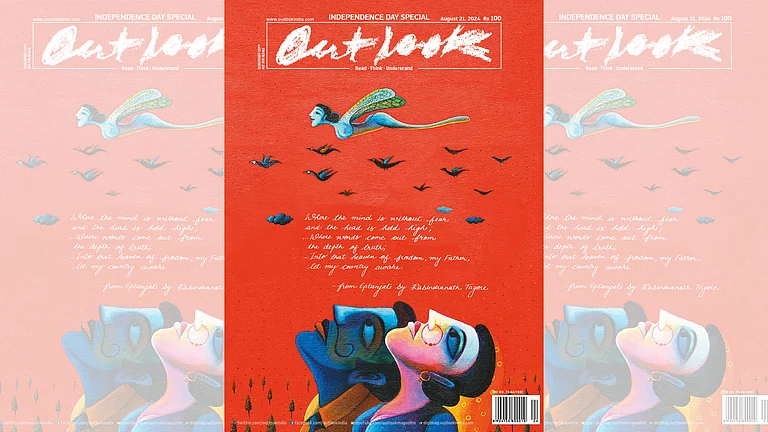More VIPs have trooped through the court of Additional Sessions Judge Vidya Bhushan Gupta than any other, from the late kisan leader Charan Singh and Arunachal Pradesh Chief Minister Gegong Apang to economic offenders like Harshad Mehta, MS Shoes promoter Pawan Sachdeva, former Planning Commission member V. Krishnamurthy and Maruti Udyog's Managing Director R.C. Bhargava. And more recently, the entire gamut of hawala scam-tainted politicians.
One reason, perhaps, why the judge of the special CBI court makes it a point to stress that the rule of law "should be applied equally to everyone". In the hawala case, he pulled up the CBI for following "a policy of pick and choose in arresting one set of accused and not arresting the other set of accused. Said he: "It is not that our country has two sets of law, one for highly-placed public servants and the other for ordinary citizens".
Ironically, he has not been able to practice this avowed commitment to uniformity in applying the law, say lawyers at Delhi's Tis Hazari district courts. They point out that while Gupta sent bureaucrats involved in the hawala case to jail, politicians have been granted bail. Said one lawyer: "Members of one class, be it politicians or bureaucrats, are being treated equally, but different classes are being being treated differently".
Gupta's votaries point out that he had no option but to grant bail to the hawala tainted politicians; he was merely following the lead of the Delhi High Court which had approved bail for BJP President L.K. Advani. Besides, the CBI did not oppose anyone's bail plea. "For Gupta ji , it must have gone against the grain to give anyone bail, especially because the CBI is yet to recover the alleged bribes," commented one lawyer.
Gupta, 47, is considered a tough judge who rarely grants bail in cases of graft and has often expressed concern over rampant corruption in the Government in his orders. Very often, applicants have to spend seven days in lock-up before bail pleas are entertained. For two senior bureaucrats charged with corruption, it was even more: former New Delhi Municipal Committee (NDMC) chief architect Ramesh Sabharwal was granted bail after a month and Surface Transport Ministry Joint Secretary C.S. Khairwal has been in jail for three weeks. Customs officials nabbed by the CBI after a raid at the Indira Gandhi International Airport were likewise remanded to judicial custody. "In the three years that he has headed the special court on corruption, I cannot think of more than two acquittals," observed lawyer P.D. Sharma, who specialises in such cases. Some lawyers feel Gupta carries his anti-corruption crusade too far and does not grant bail even when it is merited. "In cases where small amounts are involved, I feel he should be more liberal," said lawyer Rajiv Khosla.
It wasn't a passion for law or justice that brought Gupta to the bench; it was the fact that he is a vegetarian, a teetotaller and a non-smoker. He was all set to go into the hotel business after having acquired a diploma from the Institute of Hotel Management (IHM). But the five-star 'atmosphere', replete with the smells of meat, liquor and tobacco did not suit him and it needed very little urging from his father to take up law. He acquired a degree from Delhi University in 1973 and joined the Delhi Judicial Service, like his elder brother, Bharat Bhushan Gupta, five years his senior and currently additional sessions judge at the Shahadra district courts.
The brothers are known for their affability in and out of court. The younger Gupta has been known to deliver jocular comments in Punjabi while on the bench. But there is an underlying sternness belied by his mild-mannered, inoffensive persona. He has no patience with ill-prepared lawyers or sloppy investigations. In the hawala case, he ticked off the CBI severely, pointing out that "there is nothing in the record to show that any attempt was ever made by the investigating agency to recover the alleged bribe amount running into lakhs of rupees."
While he is rated as a highly intelligent and unshake ably honest judge who applies his mind to every case, lawyers speculate that the very fact the Supreme Court is overseeing the case would be enough to unnerve any judge. But Gupta, according to colleagues, is rather flattered at having been assigned the hawala case. (Earlier, in 1989, he had been appointed to a special bench by the Supreme Court to dispose of three complex cases involving a Madhya Pradesh cadre IAS officer which had been pending for 30 years). Such recognition from the Supreme Court, say his friends, are the only rewards of office which matter as far as he is concerned.
For him, the bench is a 'noble profession', which attracts respect and is a source of satisfaction. His IHM colleagues, having climbed the corporate ladder, have fully furnished homes, swanky cars and fat pay checks. But they also have 14-hour workdays and a high-pressure lifestyle. Gupta prefers his 10 to 4 job and his Maruti 800. He has plenty of time to indulge in his fondness for reading and travel.
He is very much a family man and philosophically accepts the fall-out of the hawala case on his wife and two sons. They can't go on a casual shopping trip or see a movie, what with five guards constantly in tow. After he was assigned the hawala case, Gupta has been given Y category security and is shadowed by a personal security officer and four other policemen. He has been relieved of the 300 cases pending in his court so that he can devote time to the hawala imbroglio. He may be also getting a new chamber soon. There is talk of moving him from the seedy confines of Tis Hazari to the plush Vigyan Bhawan in New Delhi.
Gupta became additional sessions judge in 1991 and soon after, was appointed to the CBI court, where he dealt with a wide range of economic offences. The discipline seems to interest the entire family; both his sons are at the Shri Ram College of Commerce, studying economics. The older, however, intends to follow his father into the legal profession, but would much rather be an advocate than a judge. The boys have a flair for numbers which Gupta says comes from their mother, who holds a masters in Mathematics. Son of a Class I officer who migrated to Delhi from Mirpur in Pakistan Occupied Kashmir, Gupta is a staunch believer in middle-class values. For instance, while he approves of education for women, he'd rather they looked after home and hearth.
Gupta acquired his tough reputation for toughness after he joined the special CBI court. His earlier stints as additional chief metropolitan magistrate, rent controller and presiding officer of the motor accident claims tribunal were low-profile. "We used to compare him with his fiery colleague, P.R. Thakur, who had once threatened to attach the car of Haryana Chief Minister Bhajan Lal. He surprised us all with his stern orders after he was appointed to the special CBI court", recalls a lawyer.
He is also a stickler for principle and once sued the Indian Railways for the princely sum of Rs 500. Stranded at Agra when the Taj Express was cancelled because of an accident, he hopped on to the first available train to Delhi and was duly hauled up by the ticket collector. The incensed Gupta approached the consumer court, pointing out that it was the Railways' responsibility to transport passengers who held con-firmed tickets and his plea was upheld. "It was a question of upholding principles," explains Gupta. That, perhaps, is what being a judge is all about.


























